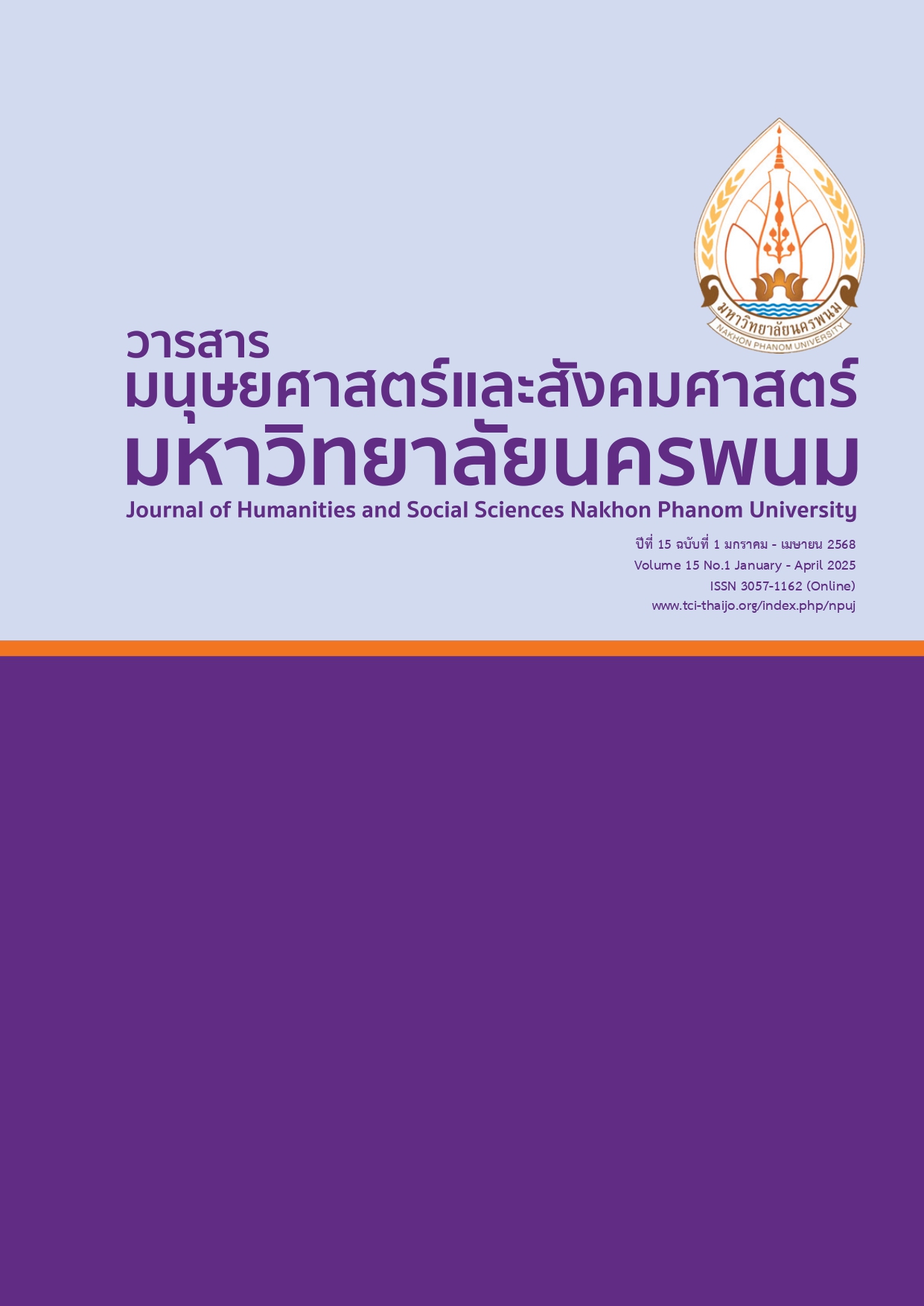Utilizing Drama Process and Social Service Learning to Enhance Lifelong Learner among Private University Students
Main Article Content
Abstract
This research aimed to develop a process for enhancing the characteristics of lifelong learning attributes among students in private university by utilizing the concepts of drama for learning and social service learning. A mixed methods research design was employed, combining document analysis and in-depth interviews with faculty members from private universities and experts in lifelong learning, using purposive sampling to identify participants. This process led to the identification of key characteristics of lifelong learners in the context of private university. In-depth interviews were also conducted with experts in service-learning and drama-based learning, also selected through purposive sampling. These informed the development of an integrated approach using both drama and social service learning methods. An action research study was then conducted with six volunteer students from a private university. Research tools included pre- and post-assessment questionnaires designed with a rating scale, analyzed using the Wilcoxon t-test, along with focus group discussion recordings to capture changes in participants. The findings revealed that the essential characteristics of lifelong learners among private university students included: the ability to live harmoniously in a diverse society, possessing a global perspective, managing multiple dimensions of life, being self-directed learners, acting as thought leaders and change agents, and understanding the processes of learning itself. The approach integrating drama and service-learning consisted of five main stages: (1) equipping students with tools for learning and drama, (2) conducting community fieldwork to identify local needs, (3) creating theatrical performances based on real community issues, (4) staging performances to foster shared experiences, and (5) summarizing and evaluating the learning outcomes from the drama creation process. The evaluation of the drama process and social service learning utilization revealed that students developed all targeted characteristics of lifelong learners of private university students.
Article Details

This work is licensed under a Creative Commons Attribution-NonCommercial-NoDerivatives 4.0 International License.
References
Anawatsirivong, T., Sindhupan, J., Sompaiboon, S. & Akkarachantachoti, P. (2004). Aesthetic Communication: Study of Performance Communication and Fiction Media. Charansanitwong Printing.
Asdornnithee, S. & Sophonsuwapap, P. (2021). A Research and Development Process of Eco-Cultural Products of Bangpakong River Basin Communities, Proceeding within the Paradigm of Holistic Development. Institute of Culture and Arts Journal Srinakharinwirot University, 23(1), 76-92. https://so02.tci-thaijo. org/index.php/jica/article/view/251661
Boal, A. (2018). Theatre of the Oppressed (P. Pharadama, Trans.). Suan Ngern Mee Ma.
Chanta, J., Chanthahin, T. & Pakothang, J. (2021). Strategies for Education Quality Development in Schools under the Office of Basic Education Commission. Journal of MCU Peace Studies, 9(5), 1964-1980. https://so03.tci-thaijo.org/index.php/journal-peace/article/view/244357
Cronbach, L. J. (1970). Essentials of Psychological Testing (3rd ed.). Harper & Row.
Dale, E. (1969). Audiovisual Methods in Teaching (3rd ed.). Holt, Rinehart & Winston.
Damrong, P. (2014). Applied Theatre: Using Theatre for Development. Chulalongkorn University Press.
Freire, P. (2017). Pedagogy of the Oppressed (S. Kulkannokwan Hamdani, Trans.). Suan Ngern Mee Ma.
Goble, G. H., Van Ooyik, J., Robertson, T. & Roberts, G. J. (2021). Effects on Students’ Academic and Non-academic Outcomes and Student Participation in Theatre Arts: A Research Synthesis. Educational Research: Theory & Practice, 32(3), 1-22. https://eric.ed.gov/?id=EJ1329015.
Kong, Y. (2021). The Role of Experiential Learning on Students’ Motivation and Classroom Engagement [Conceptual Analysis]. Frontiers in Psychology, 12,(1-4), Article771272. https://doi.org/10.3389/fpsyg. 2021.771272
Likert, R. (1932). A technique for the measurement of attitudes. Archives of Psychology, 22(140), 55-55.
Nicholson, H. (2005). Applied Drama: The Gift of Theatre. Palgrave Macmillan.
Oonjitt, D., Siri, S., Saisee, P., Putthima, B., Koiprasoet, S. & MuangMoon, S. (2024). The Study on Results of Learning Activities using Service-learning to Enhance the Social Engineering Skills for Elementary Education Students. Phimoldhamma Research institute Journal, 11(1), 19-32. https://so06.tci-thaijo. org/index.php/prij/article/view/271452
Pantumkomol, S. (1999). The Art of Performance (Modern Drama) (2nd ed.). Chulalongkorn University Press.
Rattanaubon, A. (2020). Concepts for Promoting Lifelong Education in Thai Society. Chulalongkorn University Press.
Rodríguez-Gallego, M. R., Ordóñez-Sierra, R., Domene-Martos, S. & de-Cecilia-Rodríguez, C. (2024). Company-university intersections through service-learning (SL): a systematic review. Frontiers in Education, 9,(1-10), Article 1501899. https://doi.org/10.3389/feduc.2024.1501899
Suraswadi, P. (2023). Applied Theatre Practitioners' Knowledge Management: Using Community-Based Youth Theatre for Learning, Collective Consciousness and Identity Building in Youth from their Narratives. Journal of Learning Sciences and Education, 2(1), 78-120. https://so07.tci-thaijo.org/index.php/JLSEd/ article/view/2070
Tadsa, N., Phengsawat, W. & Steannpooakao, P. (2022). Classroom Management Strategy of Effecting the Students Quality for Primary Schools Under the Office of the Primary Education Service Area in the Northeatern Region. Journal of MCU Peace Studies, 10(3), 1344-1357. https://so03.tci-thaijo.org/ index.php/journal-peace/article/view/251254
Thammaphiwat, K. (2019). Social Lab: Answering Research and Media Development for Community and Learning in the 21st Century. Chulalongkorn University Press.
Thwe, W. P. & Kálmán, A. (2024). Lifelong Learning in the Educational Setting: A Systematic Literature Review. The Asia-Pacific Education Researcher, 33(2), 407-417. https://doi.org/10.1007/s40299-023-00738-w


